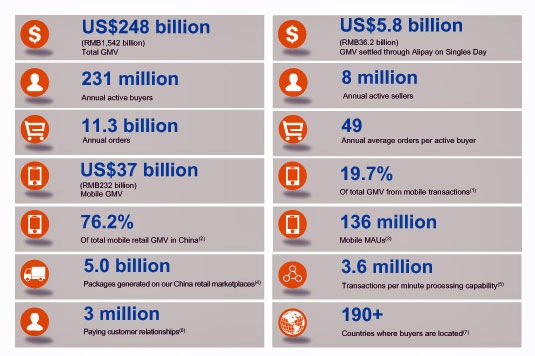
@DharaCNBC
Alibaba has finally filed for a U.S. initial public offering that will see it become the largest Chinese firm to list in New York. The question now is how much will the e-commerce giant be valued at when it starts trading.
Recent estimates put Alibaba’s value between $150 billion to $200 billion. That suggests the IPO could raise up to $15 billion, making it one of the biggest tech IPOs since Facebook (FB) listed its shares in 2012.
“There’s going to be no trouble at all with this thing having a market cap of over $200 billion in my opinion after looking at the numbers. And there’s a fair chance that in three or four years, it could be the most valuable company in the world,” said Larry Haverty, a portfolio manager at Gabelli Funds.
“Alibaba is a one-off,” he added. “U.S. investors have rarely seen a company with these kinds of growth characteristics. You have massive scale and profit growth and enormous market share.”
After weeks of anticipation, Alibaba late Tuesday filed for a nominal $1 billion initial public offering, or IPO. The ultimate offering is expected to be much higher.

The company, co-founded by former English schoolteacher Jack Ma, had listed revenue of $5.66 billion and net income of $2.85 billion for the nine months that ended Dec. 31.
It handled over 1.5 trillion yuan, or about $248 billion, of transactions for 231 million active users across its three main Chinese online marketplaces last year, more than Amazon.com (AMZN) and eBay (EBAY) together, according to Reuters.
Tech Backdrop
Still, Alibaba’s U.S. trading debut will take place at a time when high-flying stocks such as Twitter (TWTR) have fallen back to earth.
“The big guessing game is the valuation of the company when it starts to trade. Most people believe this is a company that is worth between $150 and $160 billion,” Eric Jackson, founder and managing partner at Ironfire Capital in Toronto, told CNBC.
“It’s a one-in-10-years company. In some ways people will look past the macro-environment of the moment or sell-off in momentum stocks and see this company as a unique, high–growth company,” he added.
Its platforms allow customers to buy and sell anything from luxury leather jackets to prefabricated container homes.
“We are witnessing a lot of weakness in social media stocks in the U.S. and that highlights the fact that promises and expectations are not the same as profits. And here you have a company with strong profits and it’s only going to continue to expand,” said David Joy, chief market strategist, Ameriprise Financial (AMP).
“I suspect the IPO is going to be extraordinarily well-received. It is a well-seasoned company and it is profitable,” he added.
"Your daily habits and routines are the reason you got into this mess," writes Trent Hamm, founder of TheSimpleDollar.com. "Spend some time thinking about how you spend money each day, each week and each month." Do you really need your daily latte? Can you bring your lunch to work instead of buying it four times a week? Ask yourself: What can I change without sacrificing my lifestyle too much?
1. Change your habits
Remove all credit cards from your wallet and leave them at home when you go shopping, advises WiseBread contributor Sabah Karimi. “Even if you earn cash back or other rewards with credit card purchases, stop spending with your credit cards until you have your finances under control,” she writes.
2. Leave your credit cards at home
If you do a lot of online shopping at one retailer, you may have stored your credit card information on the site to make the checkout process easier. But that also makes it easier to charge items you don’t need. So clear that information. "If you’re paying for a recurring service, use a debit card issued from a major credit card service linked to your checking account," Hamm writes.
3. Delete credit-card info from online stores
Reward yourself when you reach debt payoff goals. "The only way to completely pay off your credit card debt is to keep at it, and to do that, you must keep yourself motivated," Bakke writes. Just make sure to reward yourself within reason. For example, instead of a weeklong vacation, plan a weekend camping trip. "If you aim to reduce your credit card debt from $10,000 to $5,000 in two months," Bakke writes, "give yourself more than a pat on the back."
4. Reward yourself when you reach milestones
“Establish a budget,” writes Money Crashers contributor David Bakke. “If you don’t scale back your spending, you’ll dig yourself into a deeper hole." You can use personal finance tools like Mint.com, or make your own Excel spreadsheet that includes your monthly income and expenses. Then scrutinize those budget categories to see where you can cut costs.
5. Create a budget
Sort your credit card interest rates from highest to lowest, then tackle the card with the highest rate first. "By paying off the balance with the highest interest first, you increase your payment on the credit card with the highest annual percentage rate while continuing to make the minimum payment on the rest of your credit cards," writes Mint.com spokeswoman Hitha Prabhakar.
6. Pay off the most expensive debts first
To make a dent in your debt, you need to pay more than the minimum balance on your credit card statements each month. "Paying the minimum -– usually 2 to 3 percent of the outstanding balance -– only prolongs a debt payoff strategy," Prabhakar writes. "Strengthen your commitment to pay everything off by making weekly, instead of monthly, payments." Or if your minimum payment is $100, try doubling it and paying off $200 or more.
7. Pay more than the minimum balance
If you have a high-interest card with a balance that you’re confident you can pay off in a few months, Hamm recommends moving the debt to a card that offers a zero-interest balance transfer. "You’ll need to pay off the debt before the balance transfer expires, or else you’re often hit with a much higher interest rate," he warns. "If you do it carefully, you can save hundreds on interest this way."
8. Take advantage of balance transfers
Have any birthday gifts or old wedding presents collecting dust in your closet? Look for items you can sell on eBay or Craigslist. "Do some research to make sure you list these items at a fair and reasonable price," Karimi writes. “Take quality photos, and write an attention-grabbing headline and description to sell the item as quickly as possible." Any profits from sales should go toward your debt.
9. Sell unwanted gifts and household items
If you receive a job bonus around the holidays or during the year, allocate that money toward your debt payoff plan. "Avoid the temptation to spend that bonus on a vacation or other luxury purchase," Karimi writes. It’s more important to fix your financial situation than own the latest designer bag.
10. Put work bonus toward paying off your debt
More from U.S. News
•For Alibaba, It’s Breadth, Not Just Scale, of Ambition
•5 Things You Should Know About Alibaba
•Hedge Fund Manager Buys Most Expensive House in U.S.


Leave a Reply